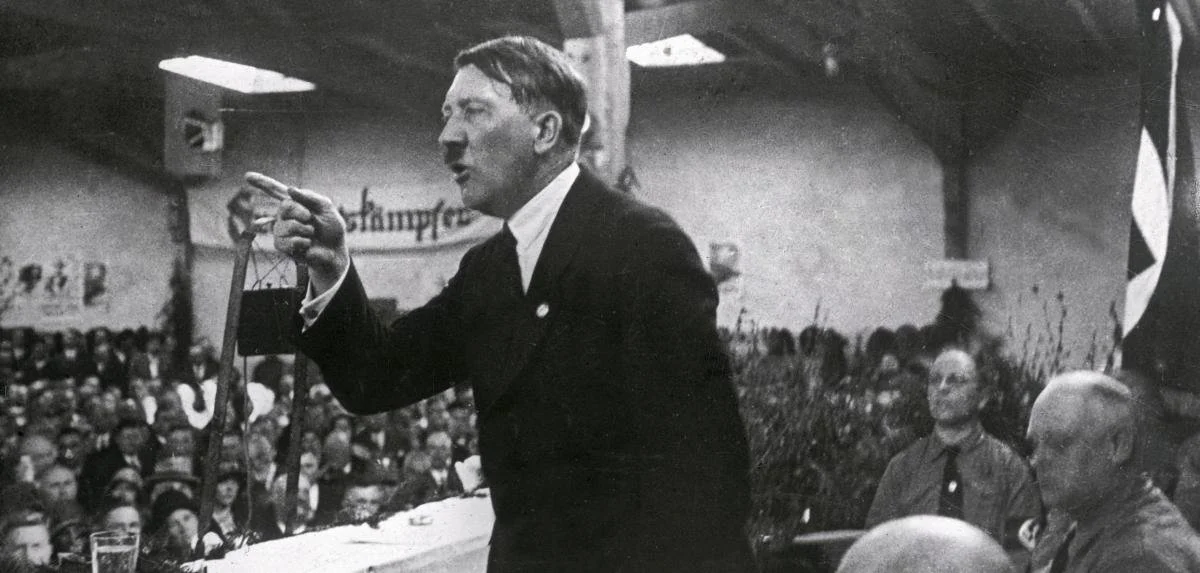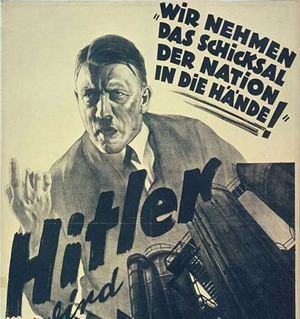‘My critical faculty was swept away. Leaning forward as if he were trying to force his inner self into the consciousness of all these thousands, he was holding the masses, and me with them, under a hypnotic spell by the sheer force of his belief… I forgot everything but the man; then glancing around, I saw that his magnetism was holding these thousands as one.’
Nazi party member reflecting on Hitler’s speech in 1922
In September 1919 a young Adolph Hitler attended a meeting of the German Workers Party. he thought them harmless, but saw the possibility for his own political ambitions. His public speaking abilities led to his rapid ascension as leader and he renamed them the National Socialist German Workers Party (NSDAP).
they would become commonly known as the Nazi’s
Hitler saw the NSDAP as an instrument for gaining power and sought to give it a military caste. He created his own personal army of storm troopers, the Sturmbabteilung or SA. The group wore brown uniforms from Germanys’ lost African colonies, hence the nickname “Brownshirts.”
The party adopted an ancient religious emblem, the swastika, as its symbol.
Research: What were the main points in Hitlers original program to gain more followers for the Nazi party?
Sources: The Munich Putsch
Hitlers first foray into power
On November 8–9, 1923, Adolf Hitler and the Nazi Party led a coalition group in an attempt to overthrow the German government. The plotters hoped to march on Berlin to launch a national revolution. But the insurrection failed miserably. Units of the Munich police force clashed with Nazi stormtroopers as they marched into the city centre. The police killed more than a dozen of Hitler’s supporters. This attempted coup d'état came to be known as the Beer Hall Putsch.
Extra reading: The Munich Putsch - Alpha History
Source 1. Bavarian Politics and the Crises of 1923. J. Spielvogel, 2020
Hitler's attempt to seize power in 1923 was played out against a backdrop of crises for the democratic Weimar government. Hyperinflation and economic chaos created fertile soil for right-wing dreams of overthrowing the Weimar democracy and establishing a right-wing dictatorship. Nowhere were these dreams more pronounced than in Bavaria and its capital, Munich. A right-wing regime had been established in Bavaria in 1920 . The Bavarian police had used their power to protect radical right-wing groups such as the Nazis. The police chief of Munich, Ernst Poehner, had openly helped Hitler's party, and one of his aides, Wilhelm Frick, later became a prominent Nazi. Bavarian courts were notoriously harsh to left-wingers while coddling right-wing extremists.
The army in Bavaria likewise opposed the republic and aided right-wing groups. General Ritter von Epp, who had played a leading role in the liberation of Bavaria from its Soviet Republic, was a Nazi sympathiser. His staff officer Ernst Roehm, joined the Nazi party and provided it with considerable material support. General Otto von Lossow, head of the Bavarian military district, also demonstrated pronounced right-wing sympathies. In 1923 the army began protecting extremist paramilitary groups, such as the Nazis' SA.
Question
What are two conclusions that can be drawn from the source about the political and military leadership in Bavaria? (2)
Source 2. Hitler goes on trial. The Beer Hall Putsch Trial - famoustrials.com
The presiding judge was Georg Neithardt, a right-leaning judge who was sympathetic to Hitler. Niehardt was shockingly deferential to Hitler, allowing him to give long speeches, question witnesses, and (often) interrupt testimony with interjections. Hitler used the trial to give long speeches that were widely publicised, significantly increasing public awareness of Hitler and the Nazis.
Hitler and three of his co-defendants (Kriebel, Phohner, and Weber) were found guilty and sentenced to five years in prison, the absolute minimum sentence for convictions. Each man would be eligible for parole in only six months, General Ludendorff was acquitted of all charges. Neithardt stated that the lenient sentences were justified by “the purely patriotic” and “noble” and “unselfish” motives of the defendants.
Question
How does source 2 support source 1?
1. The Early Years
Support for the Nazi’s was limited before the Great Depression
The Dawes plan and Stresemann’s economic policies led to an economic revival and Germans were feeling more prosperous. This led to political stability as Germans voted for moderate parties who supported the Republic, rather than more extreme parties like the Nazis who wanted to abolish it. In addition, the scaremongering was less effective and Nazi messages about the dangers posed by Jews and the need to abolish democracy largely fell on deaf ears.
Hitler was jailed and then banned from speaking in public until 1927 after the Munich Putsch. This prevented the party from campaigning effectively. While the Nazi Party was under constant pressure from Weimar authorities and was banned nationally or in certain parts of Germany.
However during this period the party was developing effective propaganda techniques under Goebbels, which would enable it to take advantage of a change in the economic situation.
To do: questions
List the reasons for the limited early success of the Nazi party.
Research: The Nazi party spent the early period developing a formidable political machine. Briefly describe the emerging strengths of the organisation.
2. The Great Depression
Did the great Depression bring the Nazi’s to power?
The Great Depression played a role in the emergence of Adolf Hitler and the Nazi party as a viable political leader in Germany. The economic chaos and resulting political upheaval created an angry, frightened, and financially struggling populace open to more extreme political systems, including fascism and communism.
Fear and uncertainty about Germany’s future also led conservative German society to search of the kind of stability that Hitler offered. He now had an audience for his antisemitic and anti-Communist rhetoric that depicted Jews as causing the Depression and communists as a threat to the existence of Germany..
While the Great Depression (and German economic conditions in general) were not solely responsible for bringing Hitler to power, they helped create an environment in which he gained support.
To do: questions
How did the Nazi’s use the chaos of the Great Depression to their advantage?
Discuss: Would the Nazi party have come to power without the economic crisis of 1929 - 1932?
Source. Hitler’s Rise to power. Ulrich, V., Hitler: A Biography. 2016.
“Nevertheless, if Hitler’s rise to chancellor was by no means the inevitable result of the Weimar Republic’s state of crisis, it was also more than just a historical mishap …. Without the specific social and political conditions of the post-war and hyperinflationary period, [Hitler] would have remained an anti-social outsider. The situation in [Munich] proved perfect soil for Hitler’s hateful, anti-Semitic tirades and his diatribes against the ‘November criminals’ and the ‘dictates’ of the Versailles Treaty. Without the consequences of the Great Depression …. The NSDAP would never have become a mass movement. It was Hitler, who best understood how to articulate and exploit people’s desires for a saviour. It was Hitler who injected order into chaos and created an ethnic community in place of a party squabbling and class warfare. It was Hitler who who would lead him the Reich to new greatness …’
Those who brought him to power agreed with his aims of preventing a return to parliamentary democracy, getting rid of the shackles of the Treaty of Versailles as quickly as possible, rearming Germany and restoring Germany’s major status as a world power. As far as Hitler’s long-term wishes were concerned, (Refer 25 Point Plan) his conservative coalition partners believed either he was not serious or that they could exert a moderate influence over him. In any case, they were severely mistaken.”
Questions
How did the Great Depression help to bring Hitler and the Nazi’s to power?
What does the source reveal about the intentions of the German political establishment?
Notes from Volker Ullrich, Hitler Volume 1, Ascent.
'Those in power appeared weak and powerless, with no solutions. Germans craved a ‘strong man’, a political messiah, to lead them out of misery and back to greatness. Hitler had always believed he was the one to do just that. His followers believed it. So he set about convincing ALL of Germany.'
Hitler was convinced he was on a divine mission. In 1930 he said, “Germany will overcome the lowest point in its humiliation in two and a half to three years.” During the September 1930 elections as the hardships of the Great Depression extended into all areas of German life. Hitler was catapulted from a curiosity on the fringe of right wing politics into the centre of German politics. Hitler’s party were suddenly very close to assuming power.
“In the past I have been a prophet of many things … at least concerning the big picture.” Hitler, 1930.
Aristocratic landowners and those conservative power brokers and cabinet members who had access to Hindenburg, urged him to appoint Hitler. These groups believed that they had co-opted him. “We’ve hired him”, chortled Papen. They felt they could use him to continue to implement their authoritarian policies.
In January 1933, Hindenburg allowed himself to be persuaded by Papen to form a coalition of “National Concentration”, with Hitler at the helm, at a time when the Nazis had suffered a significant electoral downturn.
To do: questions
How does Mr Volker charecterise Hitlers appeal?
a. Germans who supported Mr Hitler
b. How Mr Hitler perceived his appeal.

